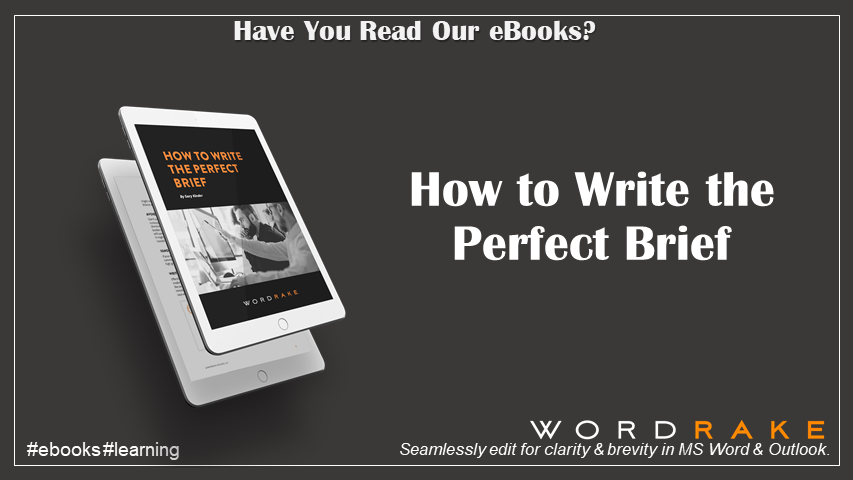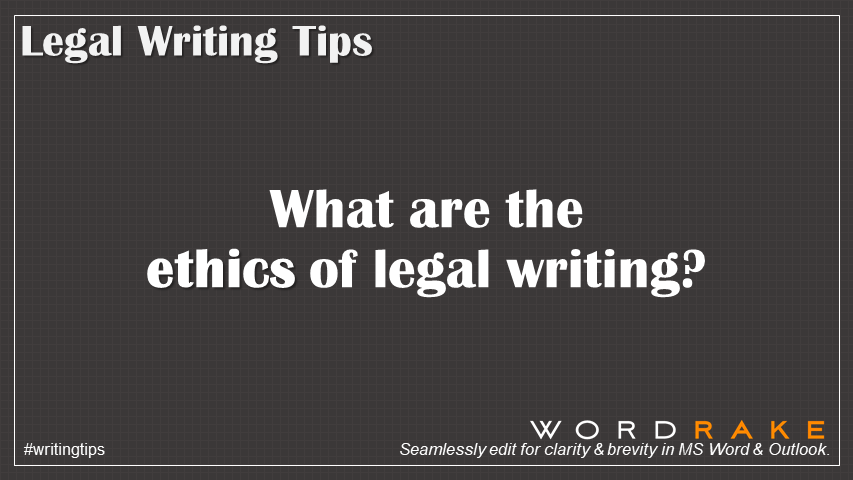Legal dramas are full of hot-headed lawyers overflowing with righteous indignation, ready to steamroll injustice by the force of their convictions. The courtroom scenes play out with biting repartee and shouts of “objection!” until at last the verdict is revealed, and the “good guys” walk away with their hard-earned, well-deserved victory. Opposing counsel glares as our heroic lawyer marches triumphantly to a waiting crowd of excited reporters and shares the good news.
Real-life courtrooms bear little resemblance to their fictional counterparts. While it may be fun to watch Elle Woods prove perjury based on a man’s fashion sense, or to watch cousin Vinny reveal a lie through astute questioning about magic grits, real legal work takes patience, forethought, ethics, and respect for the court. Drama plays well with clients’ emotions but does not lead to favorable outcomes. Aggressive documents have the same problem—they’re exciting, and they might even be a kick to write, but they won’t win you any cases.
The Ethical Imperatives of Legal Practice
Your responsibility as a lawyer is to offer your client the best advice and representation possible. Under ABA Model Rule 1.3 you must be competent, honest, and professional, acting with reasonable diligence on their behalf.
“Reasonable diligence,” if you were wondering, is an intentional downgrade from a call to represent clients “zealously within the bounds of the law” mentioned in Canon 7 and Ethical Consideration 7-1 because as it turns out, zealous representation is not always ethical. While zeal for your client is theoretically a positive trait, levelheaded decision-making and measured communication are not always qualities that zealous lawyers embody. Diligence, however—careful and thought out—implies that you should work hard, but not cross any personal or professional boundaries in the pursuit of your case.
Why Clients Think They Want Aggressive Lawyers
Clients usually have no frame of reference for how the law works outside of what they see in pop culture. They think of those fuming, caustic characters and imagine if they’re going to see justice, they need a tough, angry man ready to Hulk-out of his business suit and (verbally) throttle opposing counsel. So they go looking for a lawyer who will play hardball and pose with sledgehammers on billboards. They want sharp words, deep scowls, and slammed gavels.
But, as legal professionals, we know that the process of law is 95% careful research and writing. A lawyer sitting at a screen poring over precedent doesn’t make for entertaining TV, but it is how cases are won. The law requires substance, not posturing. Yet even aware of the requirements, between pressure from clients and that little bit of ego whispering about flash and pizzazz, it can be tempting to throw some aggressive flourishes into your writing.
The Reality of Aggressive Writing and Speech
The problem is that aggressive writing and public displays of righteous fury don’t actually win court cases. If you feel the need to resort to theatrics and accusations to make your point, it indicates that the facts were not sufficient on their own to justify your position. It doesn’t make you look like a superhero protecting the rights of the vulnerable. It makes you look like a hot-headed jerk who can’t handle themselves or craft a reasonable argument.
Rude, aggressive language will irritate your opposing counsel, and worse, turn off the judge. Everyone involved in the legal process is a human being with feelings, and a judge is no different. Antagonizing the person who you want to decide in your client’s favor is a bad plan. It’s hard for anyone to remain impartial when one party is slinging insults and accusations, and the other is behaving with professional aplomb. (It’s even worse if you’re both acting like angry tweens with an insult thesaurus. No judge has the time or patience for that.)
The Most Effective Representation—Levelheaded Professionalism
The law is about facts: what happened, what didn’t happen, and what precedent exists to support one decision or another. You must carefully analyze your information and craft an argument leaving no doubt that your client is in the right. Since accusations and insults overshadow your argument, they should not be part of any communication with the court or with opposing counsel.
Keeping language professional doesn’t mean you should not litigate aggressively on your client’s behalf. Aggressive litigation is the boldness to pursue a proactive approach to your case. Precise, planned action rather than emotionally charged reactive representation is the kind of strength that a successful lawyer embodies.
Check Yourself Before You Wreck Your Case
In addition to not being robots, your judge and opposing counsel aren’t stupid. They know an insult when they see one, no matter how many syllables it comes with. Esoteric wording does not make an accusation or a sleight more professional. Here are some ways to curb your righteous rage into court-appropriate prose:
- Look for any evasive phrases—borders on, verges on, approaches, is almost—these signal that you are about to say something aggressive, accusatory, or over the top, and want to have a way to back down if called out on it. Think of these as the lawyer version of “I’m not racist, but—.” It signals you know you probably shouldn’t say what you’re about to say. Revise these statements with more measured and direct speech.
- Read your work aloud. Do you notice anywhere that your tone changes significantly—either in pitch or speed? This may be a sign that you’ve added an emotionally charged phrase. Review the sentence to see if the change was part of the natural flow of the document, or whether something needs to be reworded to remove harsh phrasing.
- Get help! WordRake software now includes editing suggestions to tone down overly aggressive and unprofessional language. Legal writing expert and WordRake founder Gary Kinder has long called for an ethical approach to persuasive appeals, so we’re excited to include these editing suggestions starting with WordRake 4.3. WordRake will help you scale back the unnecessary vitriol while still letting you effectively object to your opponent’s claims or position:
The claim borders on laughable is overstated.
Their decision-making process approaches the trivial is overstated.
The plan being considered approaches the irrational is unreasonable, as it neglects important stakeholders’ input.
There is perhaps Maybe there is too great a striving after originality, which sometimes borders on the bizarre is sometimes unreasonable.
In the face of Faced with mounting criticism, the spokesperson issued an outright a denial of any ethical violations.
The new policy is approaching the ridiculous is unreasonable, with its convoluted rules and regulations.
To suppose that Smith could do so day after day on a factory floor borders on the fantastic is unreasonable—there is no evidentiary basis that we can find.
Jones denies this alleged “fact” as a blatantly false characterization of Cindy Hartwell’s testimony.
This is a fallacious argument an unreasonable argument and is easily countered.
Any suggestion that this system of courts “does not provide impartial tribunals or procedures compatible with the requirements of due process of law” borders on the risible is overstated.
With Jack Ferguson, it got to the point where to where he threw people under the bus blamed people whenever it was convenient for him.
These spurious claims unreasonable claims have not been substantiated by the evidence.
Conclusion
Your client may think they want you to enter the courtroom like an amped-up, televised wrestler on their behalf, but actual legal practice is more nuanced than pop culture would have the layperson believe. As a legal professional with a commitment to serve your client’s interests and uphold the law, you know better. The path to winning cases is planned and professional. Save bombastic accusations and aggressive phrasing for the writers in Hollywood. They have no place in the courthouse.
About the Authors
Ivy B. Grey is the Chief Strategy & Growth Officer for WordRake. Prior to joining the team, she practiced bankruptcy law for ten years. In 2020, Ivy was recognized as an Influential Woman in Legal Tech by ILTA. She has also been recognized as a Fastcase 50 Honoree and included in the Women of Legal Tech list by the ABA Legal Technology Resource Center. Follow Ivy on Twitter @IvyBGrey or connect with her on LinkedIn.
Kate Callahan is a Marketing Specialist for WordRake. Before her passion for learning and writing led her to join the team in 2023, she worked in non-traditional education, content creation, and translation. She started her career by teaching ESL to elementary school students in Japan. You can follow her on Twitter @KateC_Writing or connect on LinkedIn.









